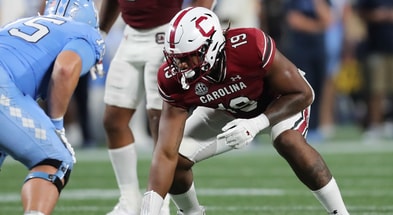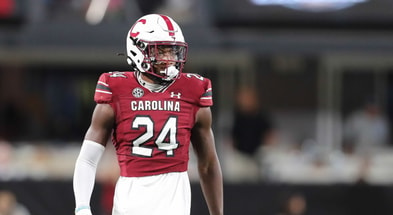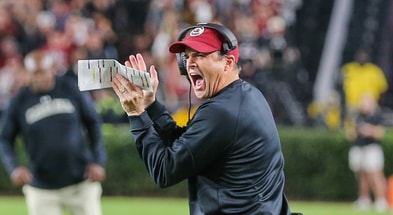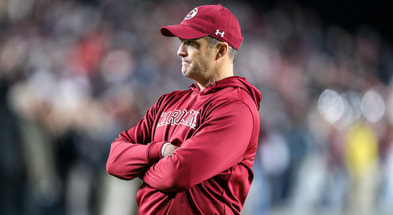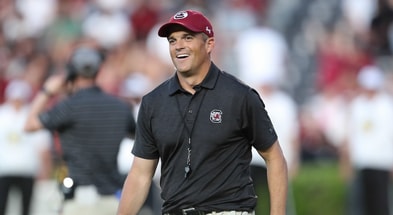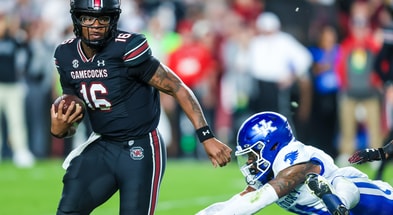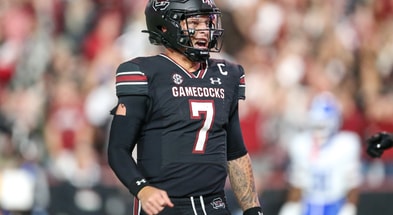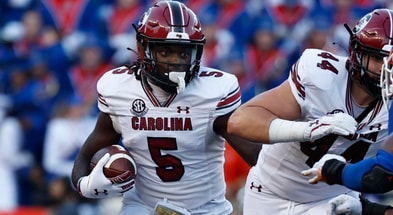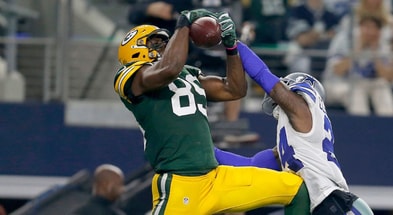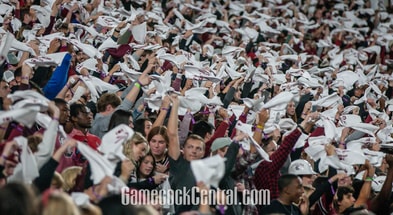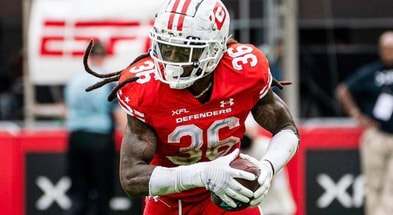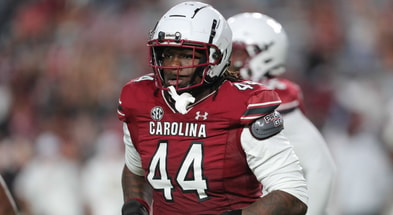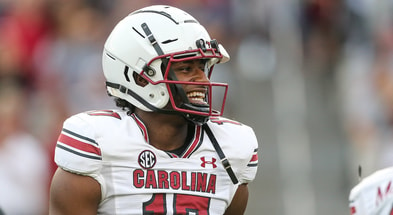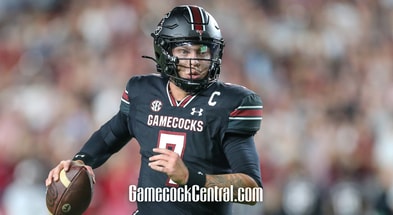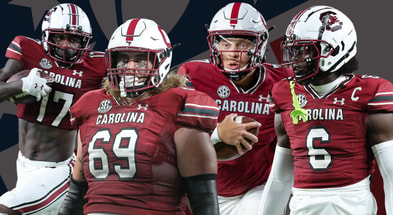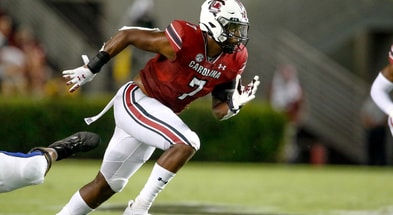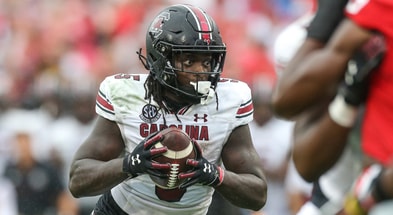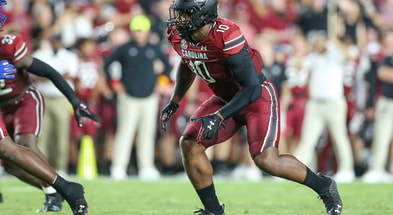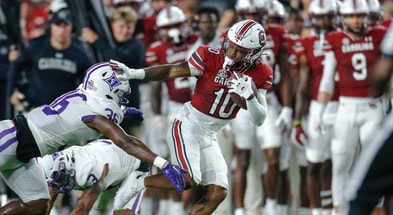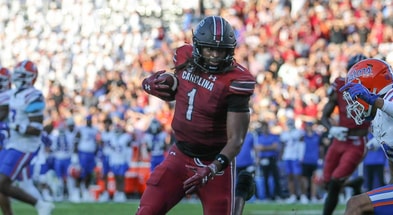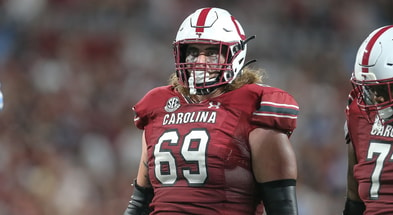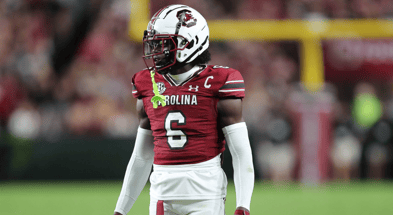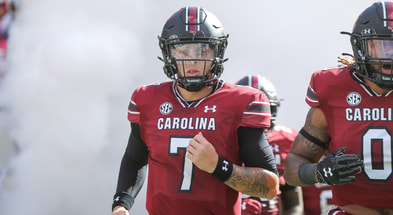Eric Poole: "Honored to be there at South Carolina…"
Introducing South by Southeast – A Gamecock History Newsletter! Alan Piercy, a lifelong Gamecock fan and Carolina grad, brings an ongoing series spanning the history of Gamecock athletics, from the SEC to the Metro/Independent years to the ACC and beyond. A sepia-toned remembrance of all things Garnet & Black. Alan is the author of the upcoming book, A Gamecock Odyssey: University of South Carolina Sports in the Independent Era (1971-1991), due for release by USC Press in November 2023.

The fruit baskets were a thoughtful idea.
Just days following South Carolina’s season-ending loss to arch-rival Clemson, putting a merciful end to the 1982 season at 4-7, a friend of the program had fruit baskets delivered to each member of USC’s beleaguered football team at The Roost athletic dormitory. The team had just lost their coach, Richard Bell, after a single tumultuous season and were cast adrift over a span of two weeks while athletics director Bob Marcum searched for a new Gamecock headman.
“I remember all of this uncertainty,” former Gamecock receiver Eric Poole reflects. Now 58, Poole was a freshman on the ‘82 squad.
“It was a bunch of young kids. The coaches were gone. We didn’t know what direction the program was going in. There was nobody around, no bed checks, no curfews.” He calls the fruit baskets a “nice goodwill gesture.”
But in that atmosphere of roiling instability, boredom, and youthful exuberance, “That fruit ended up being fuel for the biggest food fight you could ever imagine. We literally just destroyed our dorm. Some of the people that came around after that were just appalled, and I think the next morning even, we were,” Poole says, laughing at the memory. “We were like, ‘What did we just do to our dorm?’ But we were in an unusual mental state, and being 18-year-old kids, it just kind of spoke to our state of mind – we were in this period of flux.”
In short order, Marcum hired Joe Morrison away from New Mexico to lead the Gamecock program, and “everything settled down pretty quickly,” Poole says.
Of Morrison’s first season in 1983, Poole’s sophomore campaign, he recalls a distinctly different feel around the program. Indeed, when the Gamecocks took the field to open the ‘83 season on Sept. 3 versus a North Carolina team ranked just outside of the top 10, they entered to the theme from “2001: A Space Odyssey,” for the first time, beginning one of the great traditions of Gamecock athletics. The team sported updated uniforms, a snazzy sartorial upgrade – a professional look. Morrison was putting his stamp on the program early. Despite a 24-8 loss to the Tar Heels, the modern era of Gamecock football had begun.
The Gamecocks finished 5-6 that season, highlighted by a 38-14 thrashing of traditional power Southern Cal in Columbia. “We all felt a little better,” Poole reflects. “Even though 5-6 was still a losing season and not where any of us wanted to be, there was a little bit of a feeling. You could feel a little different energy, a different atmosphere, and he [Morrison] was beginning to establish his culture.”
Following Carolina’s hard-fought 22-13 season-ending loss to Clemson, Morrison told reporters, “I believe this team will mature a little bit, and on down the line will be able to turn some of these things the other way.”
Morrison proved prophetic, and “on down the line” would come sooner than anyone expected.
“Spartanburg born and raised”
Poole grew up in Spartanburg in South Carolina’s Upstate, one of three children born to Jimmy and Janice Poole, natives of nearby Gaffney and Shelby, North Carolina, respectively. Jimmy worked in the region’s once-thriving textile industry and later established his own cotton brokerage when Upstate textile jobs began to dry up in the early to mid-1990s.
Poole was a veritable Swiss Army knife at Spartanburg High School, playing quarterback, receiver, and even running back, earning all-region honors and honorable mention All-America honors during a heralded prep career. The Spartanburg program was led by legendary coach Bill Carr, who coached nearby Liberty and Spartanburg for a combined 32 seasons between 1948 and 1980, receiving National High School Coach of the Year honors in 1978. Carr retired prior to Poole’s junior season and was replaced by a name Gamecock fans would become familiar with in later years, Ellis Johnson.
Recruited by a number of in-state and regional programs, Poole’s college choice ultimately came down to Duke and South Carolina. “I almost pulled the trigger on Duke,” Poole reflects, citing their sterling academic credentials. Another pull for the Blue Devil program was offensive coordinator Steve Spurrier. “I took an official visit, met with him, and I remember thinking, ‘Wow, they throw the football a lot!’”
“It was tempting,” Poole says of the opportunity to play in Spurrier’s high-octane passing attack, “but in the end, there was just too much of a tug and a pullback to South Carolina.”
The 1984 Season
Of the legendary 1984 squad, Poole describes a feeling of cautious optimism as Fall camp began that August. “I think we were all pretty confident. I don’t think anybody had a sense we would be ranked as high as No. 2 in the nation going in, but I think there was a little bit of confidence with a year under our belts of learning the offense and defense.”
Another reason for optimism was the switch from Astroturf to natural grass at Williams-Brice Stadium prior to the ‘84 slate.
“Oh, it was the worst thing ever. We really hated it,” Poole says of the rough-as-a-cob Astroturf field. “I don’t know anybody that played with me that enjoyed that field. And it was pretty old. All of us, at one point or another, were limping around with shin splints.”
Indeed, as crews began to take up the old field, which had been in place since 1971, they encountered a thin layer of foam padding under the turf, then 32 tons of asphalt and 29 tons of gravel nearly a foot deep, which had to be broken up and hauled away. It was essentially 120 yards of roadbed inside Williams-Brice Stadium. It was replaced with a foot of sand and clay, topped by the new Bermuda turf. Added as well were rows of red tip hedges lining the back of both end zones, the shrubs and natural turf combining to soften the spartan, industrial feel of the stadium.
“We were all thrilled,” Poole says of the decision to go with natural grass.
Carolina opened the season on a shaky note, squeaking by an overmatched Citadel squad, but Poole notes the defense began to establish itself in game two with a 21-0 shutout win over Duke.
The Gamecocks moved 2–0 with an opportunity to go to 3–0 for the first time since 1977 in their next game versus Georgia. The 12th-ranked Bulldogs, meanwhile, had notched a stirring 26–23 win over No. 2-ranked Clemson the week before on the strength of a 60-yard Kevin Butler field goal with 11 seconds remaining. Before a crowd of 74,325, then the third largest ever at Williams-Brice Stadium, the Gamecocks staged a stunning 17–10 upset, spurred by Mike Hold’s fourth-quarter 62-yard strike to Ira Hillary to the Bulldog 6-yard line. The long pass set up a Hold keeper off the right side to give the Gamecocks the final margin with 8:04 remaining.
“To hold Georgia to 10 points was a pretty big deal,” Poole recalls. “Offensively, we did just enough.”
For the first time since 1980, the Gamecocks entered a top-20 poll, coming in at No. 20 in the United Press International (UPI) poll. Carolina surged to 5-0 on the season following convincing wins over Kansas State and Pittsburgh, setting up a potentially program-defining matchup at Notre Dame the following week.
Following a familiar script in the ‘84 campaign, the Gamecocks found themselves down early but played their way back into it, ultimately pulling out a 36-32 win to move to 6-0 on the season. Carolina’s go-ahead score came with just over 8 minutes remaining in the fourth quarter on a wild 33-yard scramble by quarterback Mike Hold. A final block by Poole cleared the way for Hold to plunge across the Irish goal line for a lead USC would not relinquish.
“That was an incredible day. Just to be able to go up there and play in that stadium, which has so much history and so many stories. For me, it was a humbling experience to be able to be there. To go into South Bend like that, it was special.”
The win marked the first time any Gamecock team had won six consecutive games during the same season and vaulted Carolina into the top 10 for the first time in program history, climbing to No. 9 in the following week’s Associated Press (AP) poll.
Poole described the greeting he and his teammates received upon arrival back home:
“We got back to the airport and, talk about being humbled, there were thousands of fans – and we got back around 10 p.m. – and they were there around the tarmac and lining the streets of West Columbia. They were in their cars, flashing their lights and blowing their horns as the busses went by, and I just remember feeling this incredible combination of gratitude and humility that our fans would do that – welcome us home like that – it was just amazing.” Poole continues, “And that was the beginning where we felt like this thing is turning into something really cool and special, and the season took on a different identity at that point.”
Keeping track of USC’s rising stock in the polls became a weekly focus. “If you go back to 1984, I think most of us didn’t have TVs in our dorm rooms. Some did, but my roommate and I kind of liked not having one, so we listened to the radio a lot. At some point during the season when we started climbing in the rankings, Tuesdays was when the [AP] poll came out, and we’d come back after practice, eat dinner, kind of collapse in the room, and we’d turn the radio on and late in the day the rankings would come out, so it sort of became a thing for us to lie in our rooms, just kind of waiting on the rankings to come out to see how high we were going to go. For a couple of 20-year-old kids, we were pretty jacked up about it, pretty excited.”
Poole was listening after the Gamecocks’ 42-20 win over East Carolina when USC rose to No. 5. He was listening after a hard-fought 35-28 road win over N.C. State, when the Gamecocks remained steady at five. And he was listening following a monumental home 38-26 win over Florida State when the Gamecocks rose all the way to No. 2.
“After Florida State, when we rose to No. 2, I remember feeling a little bit giddy about it, like ‘wow!’” We were all, as 18-to-21-year-old kids, pretty consumed by that. Of course, it’s up to the coaches to keep those emotions in check, and I thought our coaches did a really nice job of that, I really did [ahead of the Navy game].”
“It’s such an up-and-down game, and you have to play with reckless abandon, and it’s just a very emotional, physical game. But you have to control it. I think Coach Morrison and his staff did a really good job of keeping us down to earth. All the right things were said – we didn’t really change our routine at all.
“And then, what happened happened.”
Undefeated at 9-0 and ranked No. 2 in the country, the Gamecocks ran into a buzzsaw in Annapolis. Navy pulled the biggest shocker of the entire Division I football season, handing the Gamecocks a 38-21 loss in a game that wasn’t as close as the final score indicated. “As much as we said we weren’t looking ahead to Clemson, we probably were. In the back of too many of our minds, I think we were thinking, ‘We’ll just cruise through this and then go play Clemson,’ and Navy just absolutely took us to the woodshed.”
Poole relays a story of a recent business trip to Annapolis, where he had not been since that November afternoon in 1984.
“It was a little bit like going back to the scene of the crime,” Poole said. I had an early flight the next morning and had a 5 a.m. Uber – really nice guy – and he’s pointing out various landmarks, and he says, ‘There’s the stadium,’ and I think, ‘Oh my gosh,’ and I looked, and I could kind of see it through the trees. I said, ‘Oh my God, I was in that stadium a long, long time ago,’ and he goes, ‘Well, I’ll drive you over there.’ And I thought about it and almost said yes, but I said, ‘No, I don’t want to go over there, but thanks for the offer,’” Poole laughs before adding, “That was kind of a recurring nightmare over the years, what happened up there that day.”
Carolina salvaged a gutsy 22-21 win at Clemson in the regular-season finale to notch their 10th victory before losing a highly competitive game to third-ranked Oklahoma State in the Gator Bowl.
Despite the disappointment of Navy and the bowl loss, the 1984 season stands out as one of the finest in Gamecock history, and the ten wins were a program standard not surpassed until Steve Spurrier’s consecutive 11-win teams in 2011, ‘12, and ‘13.
“I look back on that year [1984] with a lot of fondness,” Poole says. “We competed. That was the year Coach Morrison helped us climb a little bit in stature. It was just a really fun year.”
“Old Reliable”
By Poole’s senior campaign of 1985, the Gamecocks faced substantial losses to graduation from the ‘84 squad. This was particularly pronounced on the offensive side of the ball, where Carolina graduated arguably the most talented offensive line in the country in program stalwarts Tom Garner, Del Wilkes, Jim Walsh, Bill Barnhill, and Carl Womble. Gone, too, were stand-out receivers Ira Hillary, Emory Bacon, and Chris Wade, and dependable tailback Todd Berry. The Gamecocks were in need of senior leadership, a role Poole ably filled.
A Sept. 20, 1985 article in The State tabbed Poole “Old Reliable.” It was a play on head coach Joe Morrison’s famous moniker during his playing days with the New York Giants, where his versatility and leadership across 14 seasons earned him the nickname “Old Dependable.” Poole was tasked with providing leadership to a young receiving corps, including a sophomore and two freshmen in the four-man starting rotation.
That sophomore receiver turned out to be a pretty good one – Gamecock legend and future NFL All-Star Sterling Sharpe, but in 1985, Poole was the steadying hand, the mentor, the sure bet. Though his senior campaign ended in a disappointing 5-6 record, Poole finished his career holding a trio of program records for average yards gained per reception in a game, season, and career – a testament to his efficiency and reliability.
“I’ve just become a big fan”
Poole says for a few years after graduation he didn’t follow the program very closely. “I was just kind of off doing my own thing,” he explains, but he has long since returned to the fold. A longtime veteran of medical equipment sales, Poole now lives in Charlotte with his wife, Susan, a Texas native and Texas A&M graduate. “But she has become a big Gamecock fan to survive being with me,” Poole laughs. Their daughter Carson is a rising senior at Carolina and an ambassador for the Darla Moore School of Business. Their son Collin is approaching his sophomore year at Tennessee. Emily, Poole’s daughter from an earlier marriage, accompanied him along with his father, Jimmy, for the pregame ceremony marking the 25th anniversary of the 1984 team in 2009.
Poole and family travel down from Charlotte for most home games. “When the kids got a little older, we started going and have really been doing that since. Carson will come by the tailgate since she’s been there, and it s been a lot of fun. For me, it’s been an incredible thing – I’ve just become a big fan. These last few years have just been really special.”
Poole says the “2001” team entrance still resonates with him in a profound way. “I always want to be there for “2001” – I never want to get there [to the stadium] after that. My wife makes fun of me,” Poole chuckles, “but I still get emotional, still get jacked up. I get taken right back to the mid-80s.”
He tells a story about the Texas A&M game during the COVID-altered season of 2020 when Carson was a freshman.
“It was the first game I had been to with my daughter as a student. There was just something about that day, the emotion of it, and the stadium was three-fourths empty because of COVID restrictions, and they played “2001,” and it was different because there were only 10 or 15,000 people there, but I looked over and saw her and her freshman year roommate was there. And I always get a little emotional, but I looked at her, and I just completely broke down. I shook it off pretty quick, but I was like, ‘What in the hell just happened?’ It was just an emotional moment.”
Of Shane Beamer’s program, Poole’s optimism is unreserved. “I feel really good about it. He has brought a different kind of energy to the program. It’s evident in recruiting. He has one of those personalities that just seems to be infectious. He relates well to those young players, and they’ve taken notice of what is happening at South Carolina. He’s likable, he knows football, and he knows how to build a staff. It’s been really fun to watch.”
It’s been 38 years since Poole walked away from Williams-Brice Stadium as a player for the final time and over 40 years since that impromptu fruit basket food fight at the old Roost dormitory. Looking back now, he marvels that four decades could have passed by.
He is humble, even self-deprecating in reflecting back on his career in garnet and black. “One of the good things about only having forty or fifty catches in my career is it has provided me with a certain level of anonymity,” he laughs.
But his emotional connection to the program is unmistakable.
“My whole career, I look back, and I just felt honored to be there at South Carolina. I always just looked upon it as a great privilege. I was humbled just to be there.”
